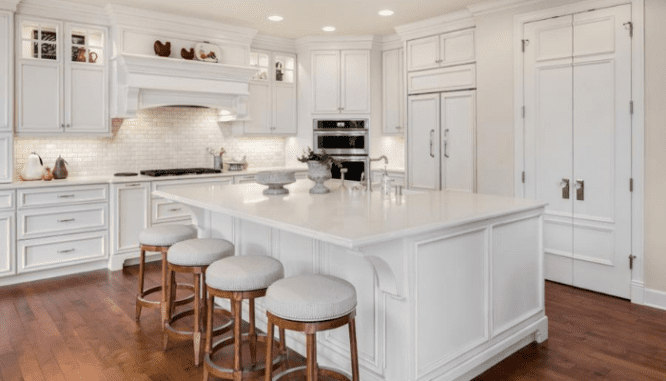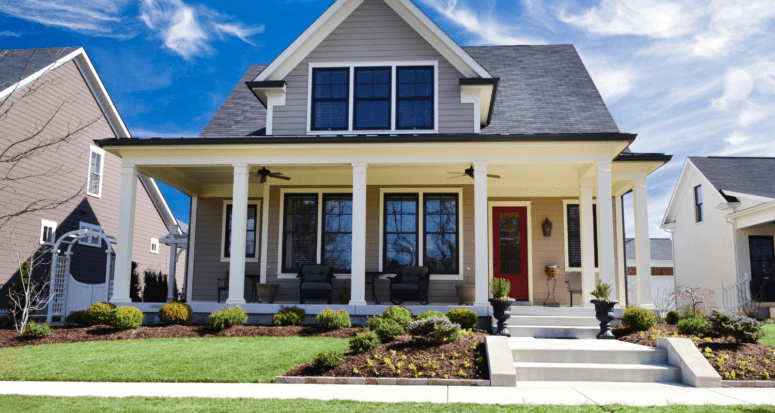How Much Can You Negotiate Off a New Build House? Here’s the Truth
- Published on
- 3 min read
-
 Kim Dinan Contributing AuthorClose
Kim Dinan Contributing AuthorClose Kim Dinan Contributing Author
Kim Dinan Contributing AuthorKim Dinan is a writer, journalist and author. She's the outdoor news editor at Blue Ridge Outdoors and writes regularly for her local paper in Asheville, NC, covering everything from the necessity of home inspections to trends in the local economy. Kim is also the author of "The Yellow Envelope," a memoir about the time she sold her house and traveled around the globe.
There are many great reasons to buy a new-build home — for example, the ability to customize the home to your liking. But the price of building your own home can vary widely ($100 to $155 per square foot, according to HomeGuide), and it depends heavily on the home’s location, the size, and if it is a custom or production new-build home.
For some buyers, the unknown cost of a new-build home can be intimidating. But before you write off your dream of owning a new-build house, understand that there are some ways to lower the price of a new build home.
So just how much can you negotiate off a new-build house? That depends. Let’s take a look at some negotiating opportunities.

First, how much does it cost to build a house?
When you buy an existing home, you know the cost (or at least the asking price) upfront. But if you’re going to build a home, the cost is more fluid.
The national cost of building an “average” home in 2020 is $248,000 (for comparison, the average cost to build a low-end home is $178,000 while the average cost to build a high-end home is $416,000.)
The cost of a new construction home depends on a number of things, including the finished lot costs, construction costs, financing costs, overhead costs, and the marketing costs and agent sales commission paid by the builder.
The cost of the home will also vary depending on whether it is a custom or production home.
What’s the difference? “Production homes are usually made by national builders that might develop an entire subdivision,” says Terry Bunch, a highly rated agent with 16 years of experience in Naperville, Illinois. There are limited styles and floor plans to choose from, and the developers build these homes at scale as much as possible.
Custom homes, on the other hand, are designed and built to the specifications of the homeowner. And they’re usually more expensive to build as a result.
Negotiate financing
One way to save on the cost of your new-build home is to negotiate financing.
Your builder is likely working with a preferred mortgage lender, says Bunch, and there can be incentives for using that lender. “Builders have affiliations with lenders,” he explains. “While overall costs from the preferred lender may be higher than a local company, the incentives that builders offer to use their lender often offset any variance.”
The incentives offered by the lender often include covering a portion — or all — of the closing costs, which can save you up to 5% of the loan value.
“When closing costs are offered, I can’t say that it has ever been disadvantageous to use the builder’s lender,” says Bunch. Still, Bunch encourages buyers to talk to several lenders before making a final decision.
If you do shop around for loans and you find a better deal elsewhere, take it to the builder’s lender and see if they will match or beat the rate or conditions that are most attractive to you.
Another negotiating tactic is to ask the builder to pay your homeowners association (HOA) fees.
An HOA is an organization in a subdivision that makes and enforces rules in the neighborhood. If your new neighborhood has an HOA, you’ll be required to pay fees that may cover everything from landscaping to community pool maintenance.
Your HOA fee might be just a few hundred dollars a year — or it could add up to thousands annually. If you’ve got a hefty HOA fee, asking the builder to cover your HOA fees for a year or more could add up to a big chunk of change over time.

Negotiate the build itself
It may be possible to negotiate over the new build itself — but be aware that builders often have a bottom-line price they need to get for the house.
Work with an agent who can help you pull comps (comparable recently sold listings), one who understands where the builder may be able to bend. “The builder knows your real estate agent is representing you as a buyer, but if your agent has a good relationship with the builder, it will allow the buyer to achieve the best potential discount available,” says Bunch.
“Agents buy and sell homes regularly and might have one set of buttons to push with one builder that don’t exist with another builder.”
Bunch says that you may have better luck negotiating price with a custom builder than a production builder.
“Production builders can be very reluctant to start discounting the home off of the base price,” says Bunch. That’s because they’ve usually built other homes in the neighborhood, and if they discount a home, “they may have to explain to the guy down the street why he paid more for his house than the person next door,” says Bunch.
Custom builders, however, may be more willing to provide a discount on a new-build home.
“What I think a custom builder would be most receptive to would be similar to a market analysis of an existing home,” suggests Bunch.
“If you can look at the history, do legwork, and identify what homes he has built or other builders have built similar to the property you want to build, you have a basis for a negotiation.”
While the discount you may be able to negotiate will be specific to the motivation of the builder, “we are talking 3% to 5%, maybe,” says Bunch. “And that depends on the starting point and where the market is currently at.”

Negotiate the price of the lot
Another potential way to save money on a new build home is to “negotiate a discount off of the lot premiums,” says Bunch.
“The custom builder frequently will have an inventory of properties or lots to choose from. If you are successful in negotiating, it’s probably because there is a clock ticking for the builder with the bank, and he needs to get something moved and wants to keep his crews busy.”
Some lots are more expensive and desirable than others, and if you want a premium lot, ask if you can get it for a lower price. On the other hand, if the lot is less important to you, you may be able to save some money just by choosing a less desirable lot in the neighborhood.
Negotiate upgrades
Sometimes if you can’t get a discount on the house itself, you can negotiate higher-end finishes and upgrades in place of a discount.
“One way to achieve an effective discount is through upgrades,” Bunch says. “An approach that I use with production builders is looking at the potential for upgrades to be discounted or provided as part of an incentive.”
Keep in mind, too, that you can often save money overall by going with the basic model for things in your home, like the backsplash or cabinets, and then upgrading them yourself down the line.
If you do choose to go with a full upgrade, make sure it’s an upgrade that will add value to your home. Your agent can help you determine which upgrades are a good choice and which aren’t worth the price tag.

Consider existing new homes
A home that has already been built doesn’t have any surprises lurking in the supply chain or labor market, so the seller doesn’t have to bake any padding into the asking price. For that reason alone, you may want to consider buying an existing new home.
Model homes fall into this category, and when you buy a model home, you can usually get a good deal on a premium home.
“The model home is going to be one of the last things the builder sells in the community. I tell buyers the best time to buy in new construction is to be the first or the last one in. Everything in between, builders are working on the margin,” explains Bunch.
“Buying a model home is advantageous because it is one of the last homes — the builder wants to move on to the next community,” Bunch says. “The kind of discounts I’ve seen requested most often with model homes are deep discounts on furnishings.”
That’s great news if you love the way the model home is decorated, or if you are worried about the cost of shelling out thousands of dollars to furnish and decorate your new home.
“Model homes will frequently have a lot of upgrades and look really pretty,” says Bunch, pointing out that the upgrades in model homes are sunk costs for the builder, so it’s easier to score a deal on an upgraded model home because the builder “just wants to move on.”
While it’s hard to come up with an exact number when determining how much you can ultimately negotiate off the price of a new build house, there is undoubtedly wiggle room in the cost of many new-build homes.
Regardless of whether you choose a custom or production home, high-end upgrades or standard models, or a premium lot, it’s important to work with an agent who knows how to get you the best deals — and one who has a good relationship with the builder.
“Pick a Realtor that has worked with a builder and is familiar with their process,” says Bunch, “and your new build will go as smooth as possible.”
Header Image Source: (jessica.kirsh / Shutterstock)
